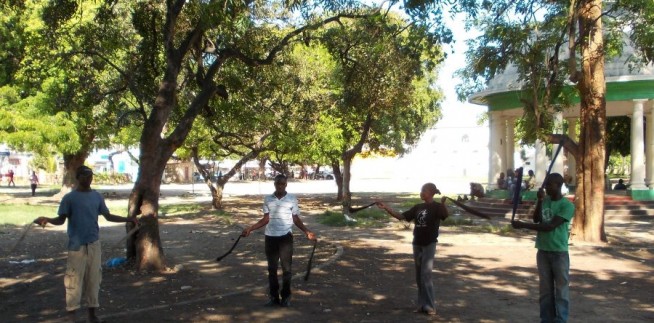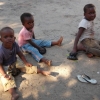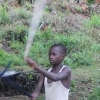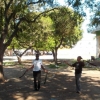MotoMoto and the Dream Catchers
Koru-Kenya’s MotoMoto program has been paired with Wema Centre for the past few months, joining our Poi and Life Skills program with their E-Learning bus to create a unique opportunity for children who spend much of their time on the streets. The approximately 30 children served by the program 3 times a week gain vital knowledge about computers while learning basic reading, writing, and math, as well as gaining self esteem through Poi and life skills through peer education.
We wanted to share stories about some of these children and youth to give you a better picture of their lives, the challenges they face, and what we hope for them in the future.
Twelve year-old Okello, pictured on the right learning Poi with weighted socks, lost both his parents when he was maybe 6 or 7 years old. No one told him how his parents died. He says, “They just got sick and died.” He went to live with his father’s brother after the death of his parents. Unfortunately, his aunt disliked the expectation that she care for a child not of her blood or her family’s blood. This attitude toward children who are not blood relations is not uncommon in Kenya, especially in families with scarce resources. She refused to pay for Okello to attend school and instead made him work in the home during the day, including carrying his cousins’ lunches to them at school. Because of this, Okello stopped attending school in Class2, at around 8 years old.
Four months ago, after living like this for more than 4 years, Okello decided he was through being unloved and treated like a servant. He left Kisumu Manyatta for Mombasa, and has been living in the streets ever since. He sleeps in a place called Maboxini where a number of street children, or ‘survivors” as they prefer to be called, stay in a small community of shacks, tents, and trees. He makes small amounts of money from carting away trash for women who cook and sell food on the streets. He even washes dishes for them sometimes. When there isn’t enough money for food from these small jobs, he digs through the garbage bins outside the many hotels which Mombasa houses.
Okello has been attending MotoMoto regularly for the past few weeks, since Koru-Kenya started its partnership with Wema Centre. As his look of concentration might suggest, he has worked very hard to learn Poi and is now comfortable with the basics. He remains very enthusiastic to learn more, and we have high hopes he will progress with his fire dancing skills, gaining confidence, self-esteem, and hope for the future as he actualizes his potential, at least in this “small” way. Okello also remains eager to return to school and finish his education. “If I find a chance to go back to school, I will just go.” We also hope he can actualize his potential in this arena also as Koru and Wema Centre make referrals and search for support for Okello.
Husna
Husna is one of the youngest participants in the program, at just 6 years old. Pictured on the far right, she’s eating with a few of the other small children who come to play on the computers from Wema Centre and eat food provided by MotoMoto. She’s not yet old enough for Poi or Life Skills, but we welcome her anyway, hoping her life may improve before she is old enough to take part in these activities.
Husna doesn’t sleep on the street. She is what’s known as being, “on the streets” rather than “in the streets.” She has a home of sorts, living with her mother. However, instead of going to school, she spends the day sitting with her mother by a Pharmacy, begging. She left school when her father separated from her mother. Like Okello’s aunt’s resistance to caring for him, father’s abandoning their children when they leave their wives is not uncommon here. Our project coordinator has spoken with Husna’s mother, urging her to enroll Husna in free primary education. However, her mother is reluctant to send Husna to school because she will get far less money from begging, perhaps not enough to support the family, without a child present to create sympathy. Unless the situation changes and her mother no longer relies on begging to feed her family, it’s unlikely Husna will ever return to school. When she reaches adolescents, if no other relatives come to help her, she may stay on the streets forever.
Patrick and Mwaniki
Both boys have fairly high levels of education for street-living youth. Patrick completed Form 2 (comparable to his second year in High School), while Mwaniki actually has a secondary school certificate. Both of their parents are alive, still working their farms in the interior of Kenya. Patrick couldn’t finish secondary school because his family didn’t have enough money. He left rural life in Voi because his friends urged him to dream bigger than a simple family farm, sowing dream-seeds of high paying jobs in the city, dreams which led Patrick to Mombasa. Mwaniki left his home in Nyeri with similar dreams. He became a matatu conductor (taking money from passengers who use the minivan-based transportation system in Kenya). The police caught him driving without a license, rather than simply acting as a conductor, and he was jailed for 6 months. After his release, Mwaniki couldn’t find work and his landlord evicted him and seized his possessions. Now, both men live in slum housing, without running water, toilets, or electricity, bathing with buckets outside the shacks they share with other survivors and using public toilets. They make money hawking small goods on the streets for commissions. Patrick, who sells cutlery and other such goods, says they can earn about 250-300ksh ($3-4) a day from hawking.
Koru embraces the idea of helping such youths return to their rural homes, where life might be more stable for them. However, as Patrick explained, “Even if I go home, they won’t take me back to school. And, it’s shameful going to the city and coming back with nothing.” Dreams of success in the city permeate rural life and failure to attain these dreams brings unbearable shame, chasing away thoughts of going home. Instead, both boys are very enthusiastic about learning Poi. They hope to become competent enough to begin performing in some of the nice hotels and other venues in Mombasa. Although such performances are not the answer to their livelihood needs long-term, they may be able to provide some income in the short term. For the future, both boys are eager to join KEPSA—the Kenya Private Sector Alliance, a program which pays for the living expenses of youth while they pursue internships with different types of businesses. Koru will help them apply as soon as applications are accepted in April. Patrick hopes to get a plumbing internship placement, while Mwaniki, remembering his enjoyment of working on his minivan as a matatu conductor, would like to become a mechanic. KEPSA internships have a high rate of employment following the program.
The futures of these and the other children and youth who come to MotoMoto have both the potential for a better life and the potential for a great deal more hardship. Although we cannot tackle all of the challenges they face, we hope providing them with the opportunity to learn, gain self-esteem, talk about their struggles, and acquire then life skills to deal with them will bring more good into their lives than they might otherwise have experienced.
-Will Ruddick
Burners Without Borders is the sole funder for this project. You can DONATE HERE to join us in helping these children to build a better life for themselves.




Comments...